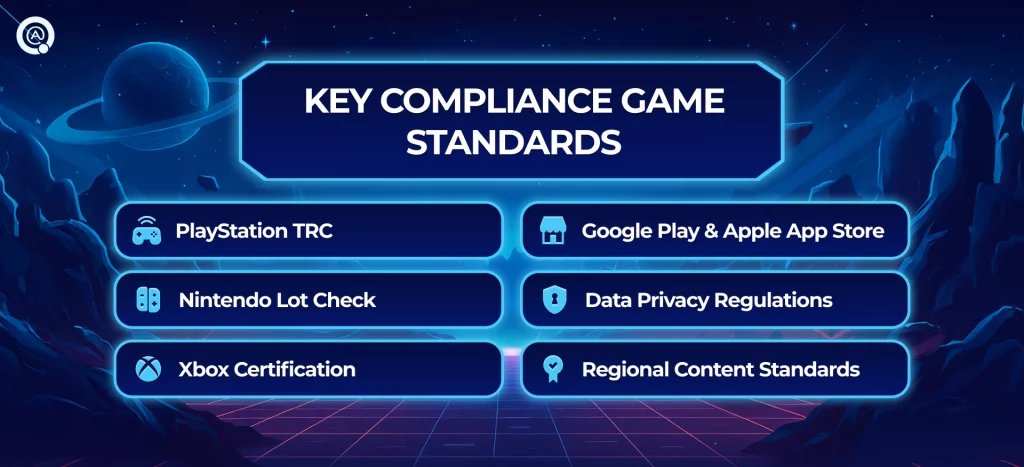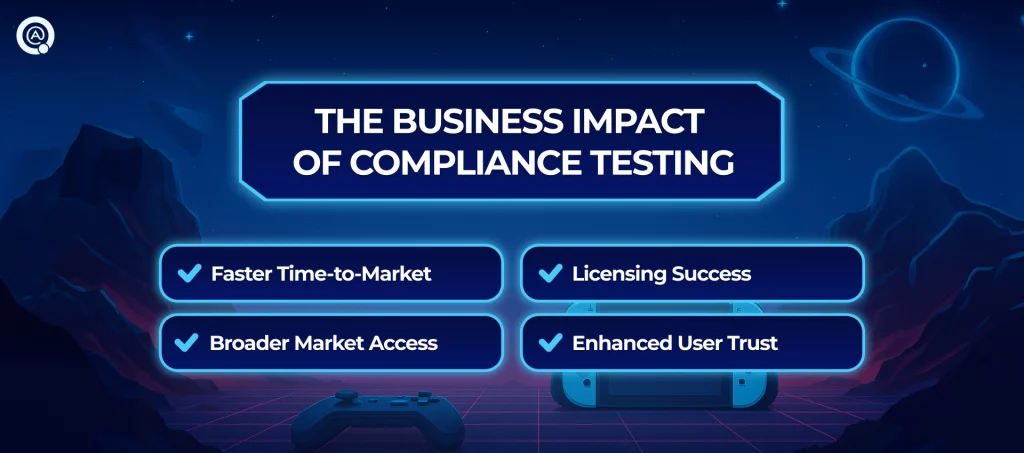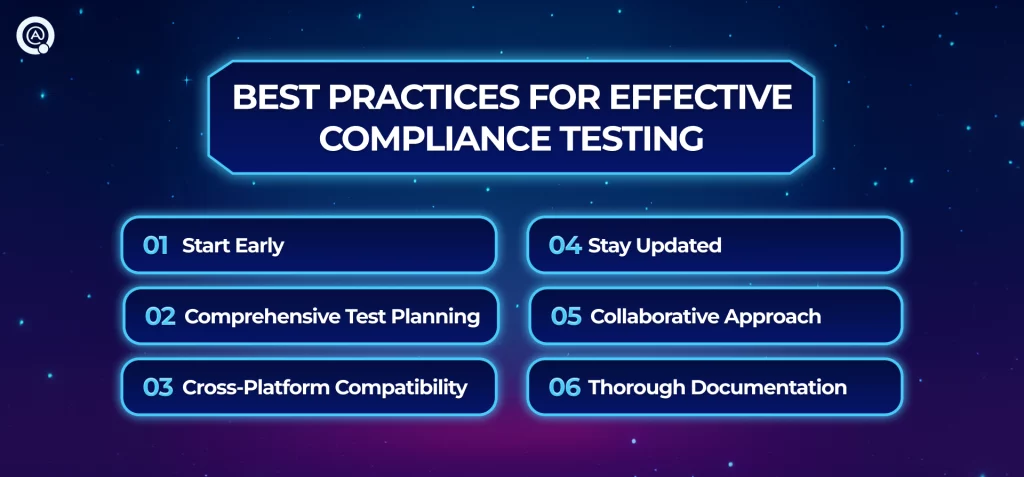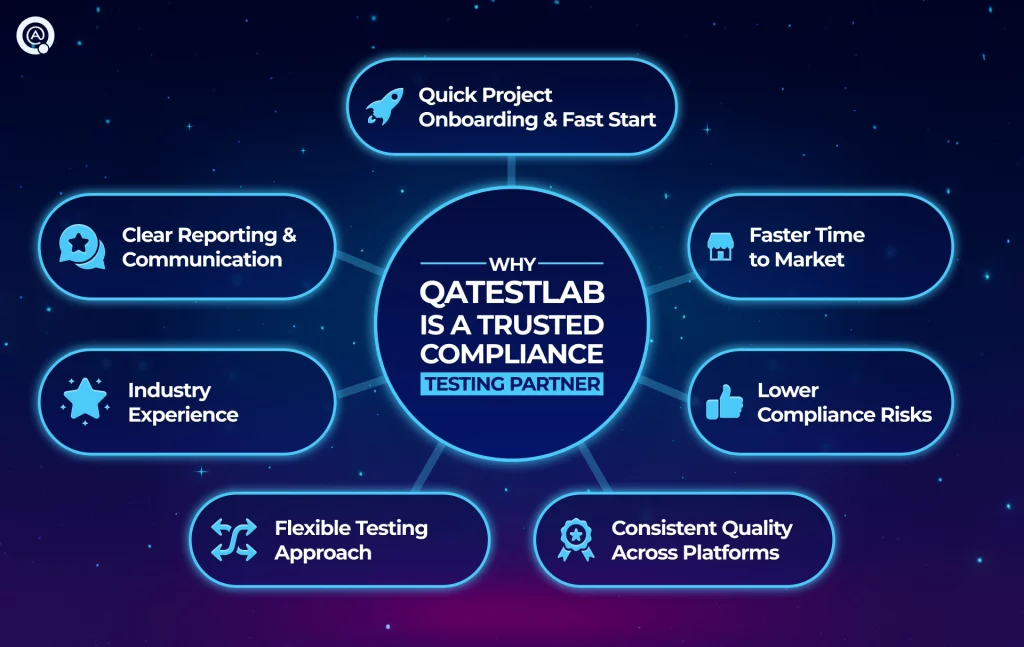- QATestLab Blog >
- Game Testing >
- Compliance Testing >
- How Compliance Testing Powers Game Releases
How Compliance Testing Powers Game Releases

What stands between a finished game and its release?
It’s not bugs or polish for many studios — it’s compliance. Whether you’re targeting consoles, mobile platforms, or global markets, aligning with platform rules and legal regulations is now a core part of launching a game.
To help you navigate this process confidently, we wrote an article outlining the key aspects of compliance testing, highlighting the standards developers need to meet, and explaining why compliance testing is critical for a smooth and successful game launch.
The Role of Compliance Testing in Game Development
Compliance testing ensures that a game meets the specific rules and technical standards defined by platforms and regulatory bodies. These include requirements related to performance, user data handling, age ratings, localization, accessibility, and content restrictions. Without compliance testing, even the most polished games risk being delayed, rejected, or missing key market opportunities.
Each platform — PlayStation, Xbox, Nintendo Switch, Google Play, or the Apple App Store — has its certification procedures, which are often updated to reflect evolving regulations and user expectations. Compliance testing ensures these procedures are followed thoroughly, allowing developers to avoid setbacks and streamline game launches.
Key Platform and Regulatory Requirements for Games
Before a game is released, it must meet various platform and regulatory requirements to ensure legal compliance, user safety, and a consistent experience across global markets. This includes data protection regulations like GDPR and COPPA, which ensure ethical data collection practices, and regional content standards for countries like China, where specific regulations exist around content and violence.
Platform-Specific Requirements Include:
- PlayStation TRC (Technical Requirements Checklist)
Ensures performance metrics like crash-free operation and loading times (e.g., 30 seconds for initial boot), critical for platform approval. - Nintendo Lot Check
Focuses on localization accuracy and child safety features, ensuring compliance with regional legal requirements. - Xbox Certification
Mandates seamless multiplayer functionality and controller compatibility for a consistent user experience. - Google Play & Apple App Store
Clear data usage disclosures and adherence to accessibility standards are required to meet app store guidelines. - Data Privacy Regulations
GDPR (EU) and COPPA (US) ensure ethical data collection, especially for games targeting children, fostering user trust. - Regional Content Standards
Define content acceptability in different markets, such as China’s restrictions on violence and sensitive topics.

The Business Impact of Compliance Testing
In addition to meeting all the standards and requirements before the game is released, compliance testing is a business-critical process that directly impacts a game’s success in the market. From accelerating release timelines to unlocking access to new regions, strong compliance practices lead to tangible commercial advantages, enabling your game to succeed globally.
✔ Faster Time-to-Market ⮕ A game passing certification on the first attempt can launch months earlier, capturing key sales windows.
✔ Broader Market Access ⮕ Compliance with regional regulations unlocks high-value markets like China, where localization and content adjustments are mandatory.
✔ Licensing Success ⮕ Regulated markets, such as those for casino-style games, require proof of compliance to secure operating licenses, avoiding legal barriers.
✔ Enhanced User Trust ⮕ Games that meet accessibility and privacy standards, such as GDPR-compliant data handling, foster player loyalty and lower churn rates.

Key Compliance Failures That Affect Game Releases
If compliance is overlooked or addressed too late, it can lead to significant delays, rejected submissions, and potential financial losses. We outline five common mistakes made during the compliance process, their impact, and real-world examples of how these failures affect game releases.
Mistake 1: Treating compliance as a post-production task
→ Risk: Issues discovered late in development often lead to failed submissions and launch delays.
→ Typical case: Mobile titles submitted without early accessibility checks are frequently held back by platform stores, delaying releases by several weeks.
Mistake 2: Using outdated platform guidelines
→ Risk: Submissions based on outdated requirements will likely be rejected during certification.
→ Typical case: Studios relying on previous versions of technical checklists have faced last-minute rework after missing newly introduced platform rules.
Mistake 3: Overlooking regional content standards
→ Risk: Inadequate localization or content mismatches can result in market restrictions.
→ Typical case: Games lacking proper alignment with local age rating systems (e.g., CERO in Japan) have been denied distribution in specific regions.
Mistake 4: Poor data handling practices
→ Risk: Non-compliance with privacy regulations such as GDPR may lead to legal actions and reputational damage.
→ Typical case: Studios that failed to implement proper user consent mechanisms had to halt live operations until compliant updates were made.
Mistake 5: No documentation of compliance efforts
→ Risk: Without proper records, resubmissions and audits become more difficult.
→ Typical case: Lack of traceable test results and change history has led to delays during platform re-evaluation phases.
Best Practices for Effective Compliance Testing
- Start Early: Integrate compliance checks from the beginning of development to identify and address potential issues before they escalate.
- Comprehensive Test Planning: Translate platform-specific and regulatory requirements into detailed test cases. Cover aspects like performance, localization, and privacy standards.
- Cross-Platform Compatibility: Ensure thorough testing across all target platforms and devices (e.g., Xbox Series X vs. Series S) to guarantee compatibility and a consistent user experience.
- Stay Updated: Regularly monitor evolving standards and platform updates and adjust testing protocols to remain compliant.
- Collaborative Approach: Foster collaboration between legal, marketing, and development teams to ensure alignment on compliance goals and effective implementation.
- Thorough Documentation: Keep detailed records of testing results, issues identified, and resolutions to support audits and simplify future resubmissions.

Why QATestLab Is a Trusted Compliance Testing Partner
At QATestLab, we provide comprehensive strategic support tailored to meet the gaming market’s unique challenges and rapid changes.
Advantage 1: Faster Time to Market
We use test automation to reduce testing time and help games pass certification faster. This allows clients to release on schedule and take advantage of market opportunities.
Advantage 2: Lower Compliance Risks
We identify issues early — from data protection gaps to platform-specific errors — helping clients avoid rejections, fines, and delays.
Advantage 3: Consistent Quality Across Platforms
We have a lab of over 500 real devices available for compatibility testing, enabling thorough checks across iOS, Android, PC, VR, and console platforms.
Advantage 4: Flexible Testing Approach
We combine manual and automated testing depending on project needs, balancing speed, scope, and cost.
Advantage 5: Industry Experience
20+ years in game QA gives us the knowledge to handle compliance requirements efficiently.
Advantage 6: Clear Reporting and Communication
Clients are provided with test documentation, including structured reports, defect logs, and regular updates, which ensure complete visibility and process control.
Advantage 7: Quick Project Onboarding and Fast Start
We can start testing game projects within 1-3 days; 30% of projects begin within 24 hours after signing the documents.

Conclusion and Recommendations
Compliance testing is a cornerstone of modern game development, ensuring quality, market access, and player trust.
If you’re managing development or product delivery, early compliance testing helps avoid costly rework and missed release dates, making your project easier to manage and your budget more straightforward to control.
Ready to launch your game with confidence? Contact us now and let’s discuss how QATestLab can support your compliance journey!

Learn more from QATestLab
Related Posts:
- ICE Barcelona 2026: Between Poker Wins and Talks on QA in iGaming
- Key QA & Game Testing Takeaways from Paris Games Week 2025
- Behind the Scenes at Nordic Game 2025: GameDev Trends and Interview with QATestLab’s Delegation
About Article Author
view more articles






